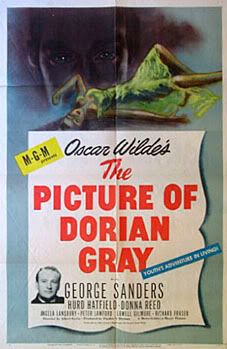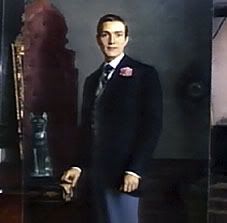
“Pleasure is the only thing worth having a theory about. It’s natures’ sign of approval. When we’re happy we’re always good. When we’re always good—we’re not always happy.”
The Picture of Dorian Gray, which shows on TCM tonight, has much to say about pleasure, it’s gratification and it’s price.
Originally written as a short story for a magazine, by Oscar Wilde in 1890, Dorian Gray (Hurd Hatfield) is a young man of astonishing beauty. His friend Basil Hallward (Lowell Gilmore) is painting his portrait when Lord Henry Wotton (George Sanders) drops in for a visit. Wotton, smitten with Dorian’s handsome features, gives the younger impressionable man his philosophy of life:
“Don’t squander the gold of your days—live. Let nothing be lost upon you. There is such little time that your youth will last and you can never get it back. As we grow older, our memories are haunted by the exquisite temptations that we never yield to. The world is yours for a season—it would be tragic if you realized it too late. There is only one thing in the world worth having and that is youth.”
Upon viewing the portrait, Dorian himself utters a strange wish:
“As I grow old this picture will remain always young. If only it could be the other way—if only it were the picture that grew old, and I were to remain always young.”
It’s a wish that many would make, but Dorian's is actually granted. With his life now devoted to hedonism, the portrait begins to age and take on the nature of Dorian’s sins of selfishness and vice--with disastrous results.

Released in 1945, Dorian was seen to be a Victorian era horror film, which was an unfortunate characterization as it placed the best two acting performances of that year into a genre that has never won an Academy Award for acting ability (although it did win an Oscar for best black and white cinematography).
Sanders is nothing short of a force in this film, delivering Wilde’s lines with a rapid-fire delivery akin to a machine gun. It’s not an abrasive style though. Phrases and double entendres are spoken with a silky smooth quality that slips past the viewer quickly and only in retrospect does one understand the meaning of Lord Wotton’s dangerous creed. The censors must have been just as spellbound. There are many things that are said or implied here that are strictly forbidden by the Hays Code, but somehow eluded them.
As good as Sanders is though, it is Hatfield who anchors the film and provides it’s finest performance. His is the less showy part and his role as Dorian is incredible in it's restraint and subtlety. There are many areas where he is just thinking or slowly moving through a room while we hear voice-over narration. His face is always a pallid mask as he is introverted, but we always know Dorian's thoughts and emotions through Hatfield's eyes. As much as Sanders role benefits from his voice, Hatfield’s work is much more emotive and difficult as his role cannot be communicated with words.
The Picture of Dorian Gray might be over 50 years old (the original story over 100), but it’s themes have never been more relevant in a narcissistic society that is obsessed with youth and personal pleasure above all things. Dorian is a man like each of us who is torn by Basil’s spiritual views and Wotton’s carnality. Like Faust, he is willing to give his soul for pleasure, but learns the lonely price of selfishness is the actuality of having to abide in his own repulsive nature.
There are also subliminal homoerotic overtones in dominance and influence of the two older men over Dorian, and in Dorian himself as we view the places he goes and stories associated with his name (one young man he is associated with commits suicide for example). This was strictly against the Hays Code, but director Albert Lewin managed to keep much of Wilde’s writing and original intent in the film while minimizing references where he felt the Breen office would be compelled to take action.

Finally, the overall look of the film is magnificent (as noted it won an Academy Award), but has one unusual feature. While the film is in black and white, whenever we view Dorian’s larger than life-size portrait, the film changes to three-strip Technicolor. It’s beautiful (like Dorian) and rather startling in later moments of the film as we see his picture changed and distorted.
While The Picture of Dorian Gray is a fictitious story, there is much truth in it’s frames. As Wilde himself once said: “Each man kills the thing he loves.” Dorian’s tragedy was to find this out too late.
